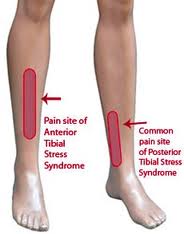Shin splints are a common exercise-related problem. The term “shin splints” refers to pain along the inner edge of the shinbone (tibia). Shin splints typically develop after physical activity and are often associated with running. Any vigorous sports activity can bring on shin splints, particularly if you are just starting a fitness program. Simple measures can relieve the pain of shin splints – rest, ice, and stretching often help. Taking care not to overdo your exercise routine will help prevent and resolve shin splints, as well as addressing any biomechanical issues in your sporting technique.
Description
Shin splints (medial tibial stress syndrome) involve inflammation of the muscles, tendons, and bone tissue around your tibia. Pain typically occurs along the inner border of the tibia, where muscles attach to the bone.
 Symptoms
Symptoms
The most common symptom of shin splints is pain along the border of the tibia. Mild swelling in the area may also occur. Shin splint pain may:
- Be sharp and razor-like or dull and throbbing
- Occur both during and after exercise
- Be aggravated by touching the sore spot
Cause
In general, shin splints develop when the muscle and bone tissue (periosteum) in the leg become overworked by repetitive activity.
Shin splints often occur after sudden changes in physical activity. These can be changes in frequency, such as increasing the number of days you exercise each week. Changes in duration and intensity, such as running longer distances or on hills, can also cause shin splints. Other factors that contribute to shin splints include:
- Muscle imbalance (e.g. tight calf muscles)
- Having flat feet or abnormally rigid arches
- Exercising with improper or worn-out footwear

At Coastal Physiotherapy our Fit 4 Running Program is designed to diagnose biomechanical issues within your running technique and correct muscle imbalances to resolve problems quickly and ensure you are able to keep running with less risk of pain and injury in the future. Our program is also suited to runners not experiencing pain as an assessment of your body and biomechanics can detect issues well before they have become painful and affecting your training. Call our clinic to book your Fit 4 Running assessment today on 5443 6634.

